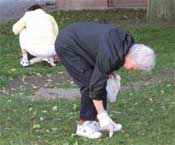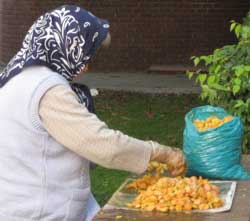I first thing I noticed was a small group of people, four or five, clustered under a tree, some kneeling, some bending over at the waist, picking up something off the ground. Then, when I got closer, I got a whiff of that smell.

"Eew," said a passing student. "What is that? Did somebody throw up?"
Not a bad guess. The sidewalk was littered with small golden-orange blobs of something...and the odor was, well, foul.
It reminded me of dog doo...you know, the pungent fresh-laid, mustardy kind that gets lodged in the treads of your shoes at the worst possible moment...like when you're on your way to a nice restaurant, or late for a meeting...when you're headed to the kind of place where a big stink and a yellow crust on the bottom of your shoe will tend to get noticed. That kind.
But clearly, this was more than one dog could doo. And why were these people picking it up?
They all wore plastic gloves, at least on the hand that was doing the picking...a wise move, I thought, considering. I stepped off the sidewalk and spotted more blobs on the grass under the tree.
"What are they?" I asked the nearest person, an older Asian woman. She glanced up, but decided to ignore me.
I paused a moment, watching as they gathered the foul golden blobs and placed them in plastic cups and old plastic grocery sacks. A breeze rustled the leaves of the tree overhead, and more golden blobs fell to the ground. Ah! One question answered.

A woman wearing a scarf was piling hers on sheets of newspaper laid atop of a brick wall. She separated each fleshy golden blob from its inner core -- a seed? a nut? -- and put it in a small blue bag.
I tried again. "What are these?
"Ginko," she said.
"What do you use them for?"
Her English was heavily accented and somewhat limited (hey, my Chinese is non-existent), but the gist of it is that she makes a dessert out of it...the meat of the nut, that is, not the stinky, pulpy flesh.
First, she said, you have to remove the seed from the flesh, and wash the seed and let it dry. Then you crack the seed open, remove the nut meat, and pound it into a paste that can be used in cooking.
Must be a very special dish to be worth all that work and all that smell.

Another woman scooched down on the ground beneath the tree, processing a pile of the golden fruit. It was her first time harvesting Ginkos, she said, and she was doing it for her mother and grandmother who remembered harvesting Ginko fruit in China. You can buy them sometimes at the market for about $3 per pound, she added, but they aren't as fresh and freshness is important.
She continued separating the seeds from the smelly pulp, dropping them one by one into a large plastic Jamba Juice cup. I thanked her, took a couple pictures, and continued on my way.
When I got to my chiropractor's office a few minutes later, I realized I'd brought something with me.
"Eew, what's that smell?"
I hurried to the restroom, grabbed some paper towels and tried to wipe the yellow pulpy residue off the soles of my shoes. But even if you rinse the soles of your shoes under a faucet, that yellow crap stays in the cracks.
I sure hope the smell goes away when it dries.




